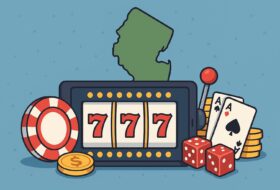
Ahead of its winter meeting in New Orleans, the National Council of Legislators from Gaming States (NCLGS) has released its draft Model Internet Gaming Act (MIGA). Once finalized, MIGA could serve as a blueprint for online casino legislation as early as next year.
The model legislation, now available for public comment, aims to establish new online casino markets that can coexist with existing gambling offerings.
It is in the state’s interest that the implementation of iGaming be accomplished in a manner that compliments, and does not adversely impact upon, the licensed casino and racino facilities that may exist in a particular state.
The draft proposes online casinos be “strictly regulated,” to “attain public confidence while shrinking illegal gaming activities and increasing new revenue to the state.”
The proposed legislation, which campaigns for uniformity from state to state, calls for a 15% to 25% tax. This range, it says, will enable individual states to “maximize revenues and allow for competitiveness with other gaming jurisdictions.”
In its coverage, our sibling site, PlayUSA noted that some states considering online gaming legislation called for higher tax rates than those in the NCLGS recommendations.
The Maryland Senate, for instance, passed a bill with a 55% tax rate on digital games (20% live dealers). New York also debated a bill that would have levied a 30.5% tax rate. NCLGS said that save Pennsylvania’s 36% online gaming tax rate, the average tax in the six other online casino states is just 19%.
Vote on Hold Until Early 2025
The draft document also features responsible gaming provisions taken from existing legislation.
MIGA’s RG suggestions include:
- Prohibiting credit card deposits
- Limiting total deposits by any individual over 24-hours to $20,000
- Creating a Player Health Program for problem gambling public awareness, responsible gaming promotion. And, to provide services for problem gambling prevention, treatment, and recovery
- Requiring each online gaming operator to identify a responsible gaming lead who collaborates with the regulator
- Prohibiting “risk-free” language in advertising
- Prohibiting advertising on college campuses
- Requiring operators to provide anonymized versions of all state-related data to any state college or university that requests the information
The NCLGS planned to vote on MIGA at its Dec. 12-15 gathering at Crescent City’s newly-revitalized flagship casino, Caesars New Orleans. However, the draft release missed the required 30-day window for public comment before a vote.
Instead, NCLGS will discuss the proposed legislation at its meeting, and leave the public comment period open until Dec. 31. Council members will follow with an official vote early next year.
NCLGS President and West Virginia Del. Shawn Fluharty told PlayUSA:
As a legislator, I fully understand the complexities of getting legislation across the finish line. I also understand the benefits of a regulated iGaming market – one that protects the consumer, raises new revenue without raising taxes and helps shrink the black market. My hope is that by bringing together regulators, legislators and industry stakeholders to provide their expertise for this model legislation, it will be a catalyst in producing public policy that will benefit states for generations to come.
According to its website, NCLGS is the only organization of state lawmakers that meets regularly to discuss gaming issues. The organization’s members chair or are members of committees responsible for gaming regulation in their state legislatures. NCLGS says it “does not promote or oppose gaming, but is primarily concerned with the proper regulation of the industry.”
NCLGS also works to educate legislators on gaming issues, to develop public policy tied to state-authorized gaming. It also represents the states before Congress and the federal executive branch on gaming-related states’ rights issues.





